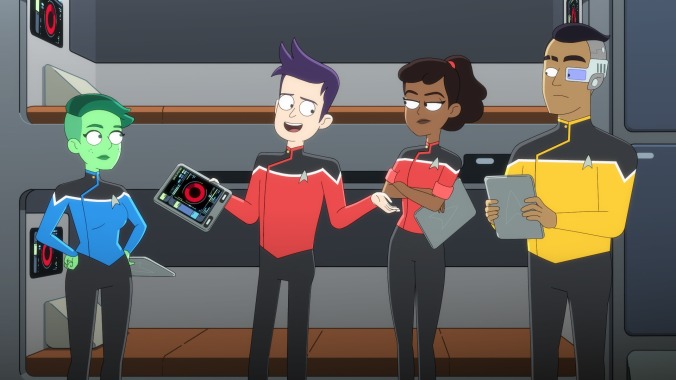On Star Trek: Lower Decks, high-concept meets low effort

“The Lower Decks” is a late season Star Trek: The Next Generation episode with an irresistible premise: what’s it like to be a low level crew-member on the U.S.S. Enterprise? As a general rule, Trek series focus on the people in charge, which makes sense; the captain and their staff are the front line against any danger the ship runs into, and they’re also responsible for making the big decisions that keep everyone safe. Ensigns are powerless—they do what they’re told without knowing what’s going on, and whether they live or die is largely dependent on circumstances beyond their control. There’s great potential for drama in that, as “Lower Decks” demonstrated. Most of our lives are spent at the whim of powers we have no say over. It’s nice to get the occasional acknowledgement that there’s a future for us, too.
Star Trek: The Lower Decks, the new animated series streaming on CBS All Access, takes that premise (and title), and runs with it. The setting has been shifted to the U.S.S. Cerritos, an Enterprise-like ship (albeit without that ship’s status and prestige) and the action focuses on four young ensigns: Beckett Mariner (Tawny Newsome), a party animal who breaks rules but gets results; Brad Boimler (Jack Quaid), an uptight nerd who does everything by the book; D’Vana Tendi (Noël Wells), an enthusiastic newbie; and Sam Rutherford (Eugene Cordero), a recent cyborg devoted to engineering. Each fits neatly into a comic archetype, and the show’s first four episodes work to put them in situations that exploit their weaknesses, presumably for comedic effect.
The problem is that, at least as of right now, The Lower Decks is less “funny” than it is “the idea of funny,” with voice actors doing high-energy, rapid-fire delivery of dialogue that’s never as witty or clever as it needs to be. Jokes are obvious when they exist, and while “obvious” isn’t always the death of comedy, there’s a difference between using familiarity to build on a gag, and just grabbing the most obvious punchline in any given situation. Too often, the first episodes present situations where intellectually you know you’re supposed to be laughing, but there’s no twist or unexpected bit of cleverness to make it fresher than every other show that’s mined similar humor. That and a reliance on fan-service references to previous Trek properties gives the whole thing a feeling of something that’s designed to deliver on fan expectations without actually satisfying them.
A large part of this is due to an inability to settle on an appropriate tone. In describing the show back in January of 2019, executive producer Alex Kurtzman called it “Rick And Morty in the world of Star Trek.” It’s hard to shake that line, especially given how much the animation style resembles Rick And Morty’s signature look. Only, “Rick And Morty in the world of Star Trek” is a fundamentally bad idea, and invoking it at all, even to the tepid degree Lower Decks manages, creates a paradox that the series struggles to overcome. Each episode simultaneously wants to undermine and mock the tropes of the franchise, while being too dependent on those tropes to ever subvert them in a meaningful way. (As an example, the title sequence features the usual stirring Trek theme over shots of the Cerritos running away from danger. It’s a cute bit, but no one on the show is actually incompetent or cowardly; even at their worst, they’re just standard Trek characters with a little more Barclay than Riker in them.)
The result is something that’s neither hilariously cynical nor meaningfully sincere—it’s functional, and rarely outright bad, but fundamentally unmemorable. There are sparks of interesting perspectives, as well as an interest in the more mundane aspects of star-jumping; Trek’s vision of a utopian future is so thoroughly baked into the series that even going so far as to point out that maybe the people in charge don’t always have the best interests of their functionaries in mind feels borderline revolutionary. And yet there isn’t a single bad person aboard the ship that we see—even the braggadocious first officer is actually a decent guy at heart. It doesn’t help that we spend more time getting to know the bridge crew than the premise should allow in the early going, signaling a strong willingness to jettison what little originality the show has in a way that doesn’t inspire a lot of confidence going forward.
There is potential here. A few of the individual storylines show sparks of life, and if the characters ever calm down, they might turn out to be endearing. It’s refreshing to have a new Trek series that actually takes place post-TNG, and once it settles on a perspective, it could actually have something worth saying. Animation allows for more interesting aliens than even CGI typically creates, and the voice cast is committed, even if none of them particularly stand out. Trek shows are notorious for taking some time to find themselves, and this one may also come into its own given breathing room. As of right now, though, it’s hard to recommend as anything more than a curiosity. There’s been a glut of new Trek content recently, and all of it has struggled to varying degrees to justify its existence as more than just a brand extension. The Lower Decks is no exception.